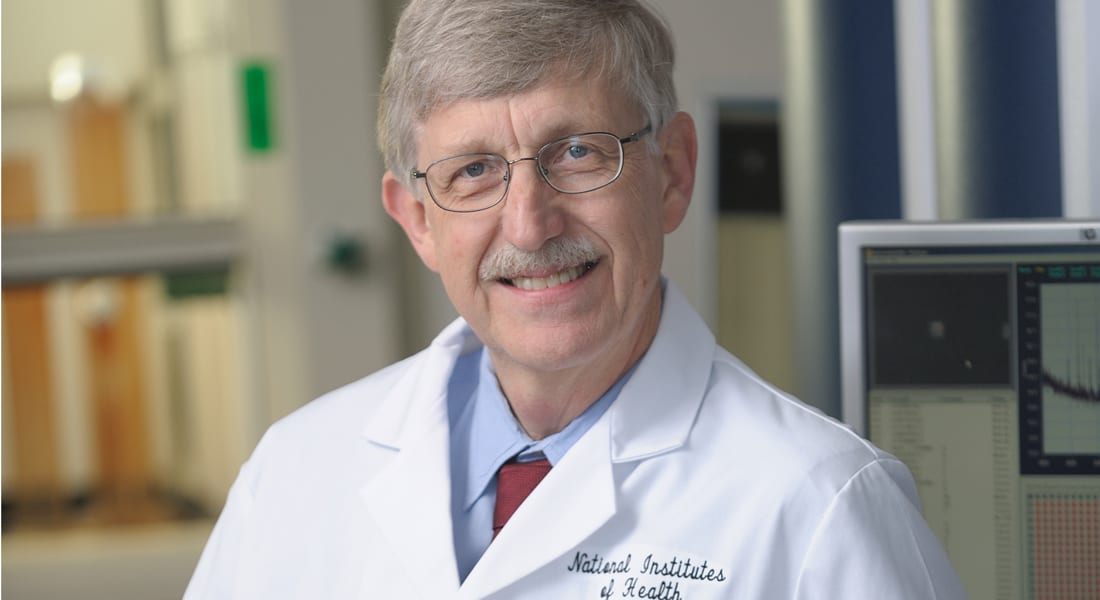Collins is best known for leading the Human Genome Project, the world’s largest collaborative biological project and one of the most significant scientific undertakings in modern history.
Francis S. Collins, M.D., Ph.D., the director of the National Institutes of Health, who may be best known for leading the Human Genome Project, will be the featured speaker during SMU’s 102nd all-University Commencement ceremony at 9 a.m. Saturday, May 20, in Moody Coliseum.
Collins — whose own personal research efforts led to the isolation of the genes responsible for cystic fibrosis, neurofibromatosis, Huntington’s disease and Hutchinson-Gilford progeria syndrome — will receive the Doctor of Science degree, honoris causa, from SMU during the ceremony. The entire event, including Collins’ address, will be live streamed at smu.edu/live.
“We are honored to have a pioneering scientist and national leader of Dr. Collins’ stature as featured speaker at Commencement,” said SMU President R. Gerald Turner. “His life is testament to a strong, unwavering commitment to the search for scientific knowledge paired with deep religious faith. He has much to share with us.”
As NIH director, Collins oversees the work of the largest institutional supporter of biomedical research in the world, spanning the spectrum from basic to clinical research. He was appointed by President Obama in 2009 and was asked to remain in the position by President Trump in January 2017. As director, he has helped launch major research initiatives to advance the use of precision medicine for more tailored healthcare, increase our understanding of the neural networks of the brain to improve treatments for brain diseases, and identify areas of cancer research that are most ripe for acceleration to improve cancer prevention and treatment.
While director of NIH’s National Human Genome Research Institute, he oversaw the Human Genome Project, a 13-year international effort to map and sequence the 3 billion letters in human DNA. HGP scientists finished the sequence in April 2003, coinciding with the 50th anniversary of James Watson and Francis Crick’s seminal publication describing the double-helix structure of DNA.
It remains the world’s largest collaborative biological project and one of the most significant scientific undertakings in modern history.
As an innovative evolutionary geneticist and a devout Christian, Collins also has gained fame for his writings on the integration of logic and belief. His first book, The Language of God: A Scientist Presents Evidence for Belief, became a New York Times bestseller in 2006. Since then, he has written The Language of Life: DNA and the Revolution in Personalized Medicine (2011) and edited a selection of writings, Belief: Readings on the Reason for Faith (2010).
Born in Staunton, Va., and raised on a small family farm in the Shenandoah Valley, Collins was home schooled until the sixth grade and attended Robert E. Lee High School in his hometown. He earned his Bachelor of Science degree in chemistry from the University of Virginia in 1970.
In 1974, Collins received his Ph.D. degree in physical chemistry from Yale University, where a course in molecular biology triggered a major change in career direction. He enrolled in medical school at the University of North Carolina-Chapel Hill, where he earned his M.D. degree in 1977. From 1978 to 1981, Collins completed a residency and chief residency in internal medicine at North Carolina Memorial Hospital. He then returned to Yale as a Fellow in Human Genetics at the university’s medical school from 1981 to 1984.
Dr. Collins joined the University of Michigan in 1984 as a Howard Hughes Medical Institute investigator, a position that would eventually lead to a Professorship of Internal Medicine and Human Genetics. Collins heightened his reputation as a relentless gene hunter with an approach he named “positional cloning,” which has developed into a powerful component of modern molecular genetics.
In contrast to previous methods for finding genes, positional cloning enabled scientists to identify disease genes without knowing the functional abnormality underlying the disease in advance. Collins’ team, together with collaborators, applied the new approach in 1989 in their successful quest for the long-sought gene responsible for cystic fibrosis. Other major discoveries soon followed, including isolation of the genes for Huntington’s disease, neurofibromatosis, multiple endocrine neoplasia type 1, the M4 type of adult acute leukemia, and Hutchinson-Gilford progeria syndrome.
In 1993, Collins joined NIH to become director of the National Center for Human Genome Research, which became NHGRI in 1997. As director, he oversaw the International Human Genome Sequencing Consortium and many other aspects of what he has called “an adventure that beats going to the moon or splitting the atom.”
An elected member of the Institute of Medicine and the National Academy of Sciences, Dr. Collins was awarded the Presidential Medal of Freedom in November 2007 from President George W. Bush. He received the National Medal of Science in 2009.
